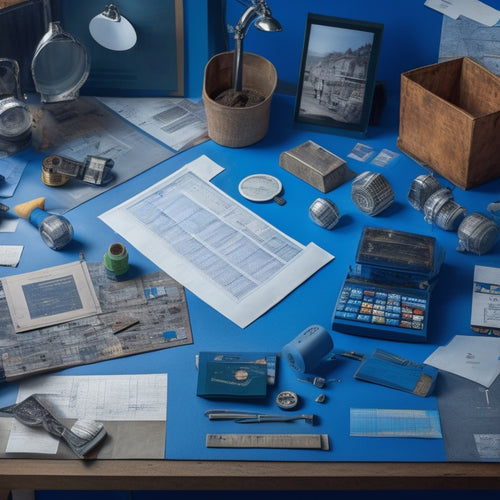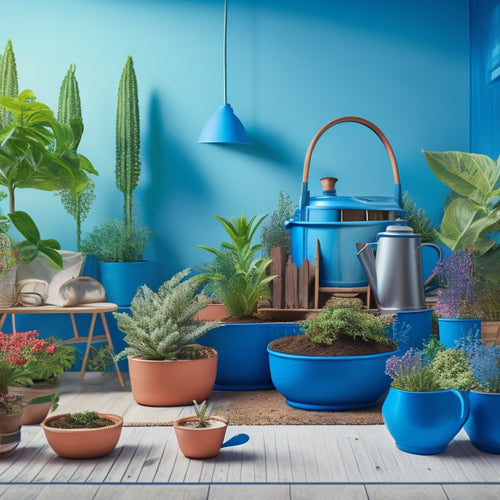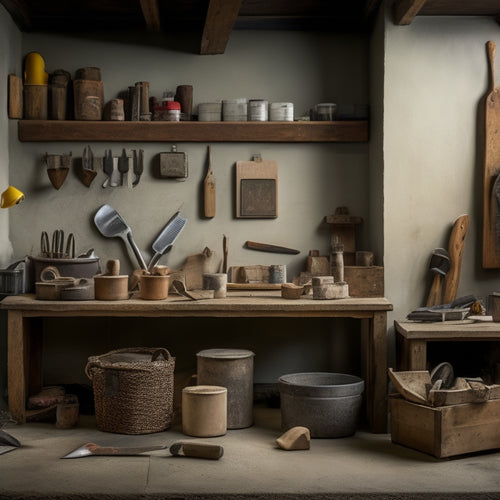
Finishing Tool Kit for Home Renovation Projects
Share
When tackling a home renovation project that involves concrete blocks, you'll need a thorough finishing tool kit that includes essential tools like levels, jointers, and masonry saws to guarantee precision and accuracy. These tools will help you achieve a professional finish, whether you're opting for a durable stucco coating, a cost-effective paint job, or a decorative veneer. As you prepare to take on your project, consider investing in specialty tools like stucco sprayers and texture guns to elevate your finishing skills and achieve high-end results. Now, explore the world of concrete block finishing and discover the techniques and tools that will take your renovation project to the next level.
Key Takeaways
• Invest in essential concrete block tools like levels, jointers, and masonry saws for precise cuts and fitting.
• Add specialty tools like stucco sprayers and texture guns to your kit for advanced finishing techniques.
• Choose the right finishing option for your project, considering factors like durability, maintenance, and UV resistance.
• Master texture application techniques, such as stamping and stenciling, for unique and professional-looking results.
• Ensure a strong foundation by addressing common concrete block challenges, including uneven surfaces and moisture issues.
Essential Concrete Block Tools
You'll need a level, a jointer, and a block hammer to split, shape, and align concrete blocks precisely during your home renovation project. These essential tools will help you achieve professional-looking results. The level guarantees that your blocks are perfectly horizontal, while the jointer is used to plane the blocks for a seamless fit. A block hammer is necessary for tapping blocks into place and breaking them apart when needed.
When it comes to block cutting, you'll need a masonry saw or a circular saw with a diamond blade. These tools will allow you to make precise cuts, guaranteeing a snug fit between blocks.
Additionally, you'll need to apply masonry adhesives, such as thin-set mortar or epoxy-based adhesives, to bond the blocks together. Make sure to follow the manufacturer's instructions for proper application and curing times.
Concrete Block Finishing Options
Three popular concrete block finishing options to ponder are stucco, paint, and veneer, each offering a unique aesthetic and level of protection for your newly constructed wall.
You'll want to contemplate the durability and maintenance requirements of each option, as well as their compatibility with your local climate and building codes.
Stucco, for instance, provides a durable, weather-resistant finish that can be textured to create a unique visual appeal.
Paint, on the other hand, offers a cost-effective solution that can be easily updated with a fresh coat.
Veneer, a decorative coating made from natural or synthetic materials, adds an extra layer of protection while also enhancing the wall's appearance.
When choosing a finishing option, you'll need to evaluate factors such as UV resistance, moisture tolerance, and color retention.
Textured finishes, like stucco or veneer, can add visual interest to your wall, while decorative coatings can provide an extra layer of protection against the elements.
Specialty Tool Kit Additions
To guarantee a professional-grade finish, incorporate specialty tools, such as a stucco sprayer or a texture gun, into your kit to achieve uniform coverage and precise pattern control. These tools will allow you to tackle complex finishing tasks with ease and precision. For instance, a stucco sprayer enables you to apply stucco mixtures with accuracy, reducing mess and waste. A texture gun, on the other hand, helps you achieve intricate patterns and designs on your walls and ceilings.
To take your finishing skills to the next level, consider adding specialty sanding tools to your kit. These tools are designed for advanced finishing techniques and can help you achieve a high-gloss finish or a smooth, matte finish, depending on your desired outcome.
With the right specialty tools, you'll be able to tackle even the most challenging finishing projects with confidence. By investing in these tools, you'll be able to deliver professional-grade results that will impress even the most discerning clients.
Common Concrete Block Challenges
When working with concrete blocks, one of the most frustrating challenges you're likely to encounter is uneven block surfaces, which can lead to poor mortar adhesion and a weakened overall structure. This issue can be particularly problematic when trying to achieve a smooth, even finish. You'll need to address these irregularities before applying any finishes, as they can compromise the structural integrity of your project.
Another common challenge you'll face is block moisture issues. Concrete blocks are porous, which means they can absorb moisture from the surrounding environment. If not properly addressed, this can lead to efflorescence, discoloration, and even structural damage. You'll need to guarantee that your blocks are properly sealed and protected from moisture to prevent these issues from arising.
Structural integrity concerns are also paramount when working with concrete blocks. You'll need to confirm that your blocks are properly aligned, level, and securely fastened to prevent shifting or settling over time. Any deviations from proper installation techniques can lead to cracks, crumbling, or even catastrophic failure.
DIY Concrete Block Finishing Tips
Regularly, you'll need to employ specialized techniques to achieve a smooth, even finish on your concrete block surfaces. Understanding these DIY concrete block finishing tips is vital to overcoming the challenges discussed earlier. To get started, focus on block surface preparation, guaranteeing the surface is clean, dry, and free of any debris or imperfections. This will provide a solid foundation for the finishing process.
Here are some essential DIY concrete block finishing tips to keep in mind:
-
Master the art of texture application techniques: From stamping to stenciling, understanding the various texture application methods will allow you to achieve the desired look and feel for your concrete block surfaces.
-
Use the right tools for the job: Invest in high-quality finishing tools, such as trowels, floats, and edgers, to guarantee a professional-looking finish.
-
Work in small, manageable sections: Divide your concrete block surface into smaller areas to maintain control and achieve a consistent finish.
- Don't skip the sealing process: Apply a high-quality sealant to protect your finished concrete block surface from the elements and guarantee its longevity.
Frequently Asked Questions
What Safety Precautions Should I Take When Working With Power Tools?
When working with power tools, you should take essential safety precautions to avoid accidents.
First, make certain you're wearing necessary safety gear, including gloves, safety glasses, and a dust mask.
Regularly perform tool maintenance, checking for worn or damaged cords, loose handles, and dull blades.
Also, keep your work area clean and clear of obstacles to prevent tripping or slipping.
Can I Rent or Borrow Tools Instead of Buying a Kit?
Imagine you're a DIY enthusiast, tasked with renovating a friend's kitchen. You need a jigsaw for a day, but buying one seems excessive.
Luckily, you can explore tool rental or borrowing options. You can rent a jigsaw from a local hardware store or borrow from a friend who's already invested in one.
This approach saves you money and storage space, allowing you to focus on the renovation itself.
How Do I Store and Organize My Tool Kit Efficiently?
When it comes to storing and organizing your tool kit efficiently, you'll want to implement smart tool storage and organization strategies.
Start by categorizing your tools by type, frequency of use, and size.
Designate a specific place for each tool, using dividers, bins, and labels to keep them separate and easily accessible.
Consider investing in a portable storage case or toolbox with customizable compartments to maximize space and keep your tools protected.
Are There Any Specific Tool Kits for Small or Large Renovation Projects?
You're getting down to brass tacks, and it's time to tailor your tool kit to your project's scope.
For small renovation projects, you'll want to focus on compact, precision tools like a cordless drill and a set of screwdrivers.
On the other hand, large renovation kits should include heavy-hitters like a circular saw, impact driver, and a robust set of pliers.
Don't try to be a jack-of-all-trades; instead, curate your kit to match your project's unique demands.
Can I Use a Finishing Tool Kit for Other Types of Masonry Projects?
You're wondering if you can use a finishing tool kit for other types of masonry projects beyond renovation work. The answer is yes, you can.
These kits offer versatile applications, allowing you to adapt various masonry techniques to suit your project needs.
With the right tools, you'll be able to tackle tasks like tile setting, concrete finishing, and more with precision and control.
Conclusion
As you commence your home renovation project, remember that a solid foundation is just the beginning.
The true artistry lies in the finishing touches.
With the right tools and expertise, you can transform raw concrete blocks into a masterpiece that exudes sophistication and character.
The devil is in the details, and it's the subtle nuances of your finishing technique that will set your work apart from the rest.
Related Posts
-

5 Best Home Renovation Project Timeline Checklists
You're looking for a clear understanding of the timeline for your home renovation project. A good place to start is w...
-

3 Best Planter Shopping Timeline Tips for Renovators
When incorporating planters into your renovation project, you'll want to plan carefully to avoid delays and guarantee...
-

3 Beginner-Friendly Tools for Plaster Renovation Success
You'll be glad to know that the three essential tools you need for a successful plaster renovation are the same ones ...


